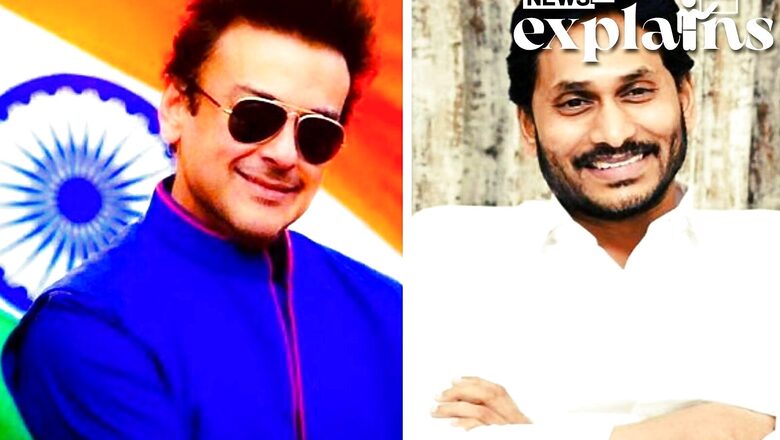
views
A controversy began on Wednesday after singer Adnan Sami took to Twitter to celebrate RRR’s historic win at Golden Globes 2023 awards. The SS Rajamouli-directed film was the first Asian film to win Best Original Song for the hit song Naatu Naatu.
However, Adnan Sami also reacted to Andhra Pradesh Chief Minister YS Jagan Mohan Reddy’s congratulatory tweet minutes after his own.
“The #Telugu flag is flying high! On behalf of all of #AndhraPradesh, I congratulate @mmkeeravaani, @ssrajamouli, @tarak9999, @AlwaysRamCharan and the entire team of @RRRMovie. We are incredibly proud of you! #GoldenGlobes2023,” CM YS Jagan Mohan Reddy had tweeted.
Telugu flag? You mean INDIAN flag right? We are Indians first & so kindly stop separating yourself from the rest of the country…Especially internationally, we are one country!This ‘separatist’ attitude is highly unhealthy as we saw in 1947!!!Thank you…Jai HIND!???????? https://t.co/rE7Ilmcdzb— Adnan Sami (@AdnanSamiLive) January 11, 2023
Reacting to his tweet, the singer tweeted, “Telugu flag? You mean INDIAN flag right? We are Indians first & so kindly stop separating yourself from the rest of the country…Especially internationally, we are one country! This ‘separatist’ attitude is highly unhealthy as we saw in 1947!!! Thank you…Jai HIND!”
What YSRCP Has Said
An Andhra Pradesh minister hit back at singer Sami. Industries, Infrastructure and Information Technology Minister Gudivada Amarnath told Adnan Sami that he is no one to pass judgment on their patriotism.
“We are proud of our language, our culture and our identity. And I proclaim again, WE ARE TELUGU. @AdnanSamiLive, you are no one to pass judgement on our patriotism,” tweeted the minister.
“My pride in being Telugu does not take away from my identity as an Indian,” he added.
Whilst exhibiting pride of Origin, it is not beneath the dignity of a senior statesman such as a Chief Minister to share the pride of this achievement with his Nation INDIA which this State comes under & in the name of which this Telugu film is being recognised abroad! https://t.co/Oj5NydOsf3— Adnan Sami (@AdnanSamiLive) January 11, 2023
Adnan Sami, who became an Indian citizen in 2016, had found fault with the Chief Minister’s congratulatory message. While congratulating the “RRR” team for winning the award for the “Naatu Naatu” song, Reddy tweeted: “The Telugu flag is flying high”.
“Telugu flag? You mean INDIAN flag right? We are Indians first & so kindly stop separating yourself from the rest of the country. Especially internationally, we are one country! This ‘separatist’ attitude is highly unhealthy as we saw in 1947!!! Thank you Jai HIND,” wrote Sami.
How Did Twitter React?
However, the singer received flak for his remark from many Twitter users who defended the Andhra Pradesh Chief Minister and reminded him that being proud Telugu does not make one less Indian.
“If only you cud read the underlying emotions of a telugite expressing his ethnic pride ,u wudn’t hv com up with ur Nationalism platitudes . Being REGIONAL makes us no less INDIAN than any of our Northern counterparts nor it leads to fissiparous tendencies keep ur gyan to urself,” wrote a netizen.
“With that logic, being Indian doesn’t make you any less regional,” argued Sami.
“But you have taken an innocent statement of regional pride out of context and are now forcing 600K fellow Indians to see your perspective through a separatist lens just because it was not aceworded politically correctly”, wrote another ATwitter user.
“A Chief Minister of a great State has all the means, facilities & responsibility to word a statement as aPolitically Correct’!!aPeriod!!,” responded the singer.
Do Indians Relate More to Their Regional Identity or National?
The regionalism vs national identity debate has remained in India for a long time. Since India became a nation, people have wondered whether regional pride diminishes a federal nation identity or has no correlation on its own.
A 2021 Indian Express report attempted to explore people’s preferences using data from ‘Politics and Society Between Elections,’ a collaborative study conducted by Lokniti-CSDS and Azim Premji University between 2016 and 2018.
People were asked whether they felt more connected to their regional or national identities. Overall, nearly one-third (36%) were concerned with national identity, while 30% were concerned with state identities. A little more than a quarter (27%) of people preferred both equally.
Regional sentiment is stronger in some states than others, the report said. For example, state identities were more important to people in Jammu and Kashmir (65%), Tamil Nadu (56%), Mizoram (51%), Odisha (47%), Nagaland (46%), and Gujarat (37%).
Some states identify primarily as national in nature. The majority of these are concentrated in the Hindi heartland: Haryana (66%), Delhi (63%), MP (61%), Rajasthan (51%), Bihar (48%), Uttar Pradesh (47%), and Jharkhand (46%).
Outside of the Hindi heartland, a few states have a higher proportion of people who identify as ‘Indian,’ including Maharashtra (57%), West Bengal (44%), and Tripura (42%). People in some states preferred both identities equally — Chhattisgarh (50%), Uttarakhand (44%), Punjab (43%), Kerala (38%), and Assam (37%).
What is the History of Regionalism in India?
Colonial policies, differential attitudes and treatment by the British towards princely states and those of the presidencies developed regionalist tendencies. The exploitative economic policies of the United Kingdom completely ignored some regions, resulting in economic disparities and regional imbalances.
The formation of the States Reorganisation Committee resulted from protests for separate states across India (headed by Faisal Ali). It advocated reorganising Indian states along linguistic lines, reinforcing regionalist tendencies. The establishment of linguistic states became a reality with the passage of the States Reorganisation Act in 1956.
Positive and Negative Regionalism
According to reports, scholars believe that regionalism plays an important role in nation building if the demands of the regions are met by the country’s political system.
Regional recognition in terms of statehood or state autonomy provides people in that region with self-determination, making them feel empowered and happy. Internal community self-determination, whether linguistic, tribal, religious, regional, or their combinations, has remained the dominant form in which regionalism in India has sought to express itself, both historically and currently.
Regional identities in India have not always defined themselves in opposition to and at the expense of national identities; however, such a process has had a democratic effect in that India’s representative democracy has moved closer to the people, who feel more involved and show greater concern for institutions of local and regional governance.
Tripura Tribal Autonomous District Council (TTADC), for example, formed in 1985, has served to protect an otherwise endangered tribal identity in the state by providing a democratic platform for former separatists to become a party of governance, thereby significantly reducing the state’s bases of political extremism.
In such a political environment, there is always room for balanced regional development. The socio-cultural diversity is respected, and it allows the people of the region to practise their own culture.
However, regional movements frequently result in violent agitation, disrupt law and order, and have a negative impact on the state and national economies. Regionalism can serve as a cover for militancy and extremism, posing an internal security threat. Regionalism can sometimes also undermine national interests by acting as a stumbling block in international diplomacy.
A Pluralistic Way Ahead
For the Indian nation state to retain its pluralistic character, the ethos of Unity in Diversity must be preserved. It is necessary to accommodate a diverse population’s multiple aspirations, say experts. There is a need for states to increase their social expenditure on education, health, and sanitation, which are the foundations of human resource development.
An example of a positive step in this direction was the establishment of the NITI Aayog toward strengthening cooperative federalism by encouraging state governments in India to participate in economic policymaking from the ground up.
Read all the Latest Showsha News here
















Comments
0 comment